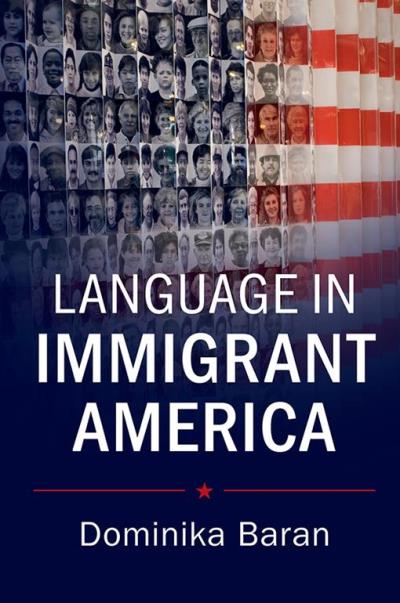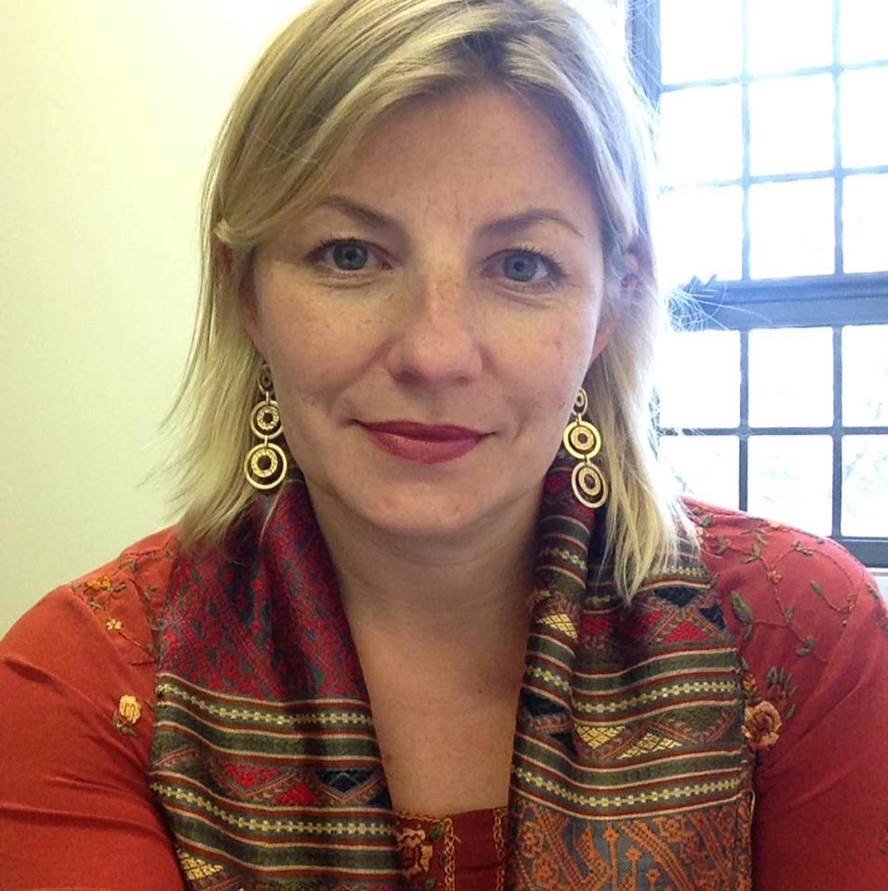Dreamers affected by the Deferred Action for Childhood Arrivals program had a reprieve from its expected expiration earlier this month, after courts intervened to postpone action on the issue until the fall. But uncertainty about their fate still lingers, as does the ongoing debate over the future of United States immigration policy. Amid a steady rise in the explicit white nationalism, it’s clear that Americans are fundamentally divided over the question of how national identity is formed and who gets to be included.
In September of last year, just as President Donald Trump first announced his intention to end the DACA program, Duke University professor Dominika Baran published a book called Language in Immigrant America , which looks at immigration through the politics of language. Baran is herself an immigrant who arrived in America from Poland as a teenager, speaking barely any English at the time. Now, in her scholarly work, she studies the experience of living life through a “second language”—a complexity that people of traditionally non-English-speaking parts of the globalized world grapple with.
Baran spoke with Pacific Standard by email to discuss her own experiences navigating the foreign culture of an American high school, what it means to have a hyphenated identity, and why a nation-state thinks it needs one primary language to call its own.

You were 15 when you moved to the U.S. from Poland, and spoke only minimal English at the time. How was your high school experience affected by language?
For one, I didn’t really understand the concept of an American high school, which in my case was a large public school with different groups like “jocks” and “theater people.”
As for language, I read my books with a dictionary. I distinctly remember looking up the word “occur” when reading my earth science textbook.
I never learned the slang meaning of “cool,” as in “hip,” not “cold.” Remember, there was no Internet in those days [the late 1980s], and television access in Poland had been very limited. We didn’t learn much English slang. I figured out what it meant from context, but I wasn’t sure if I was hearing it correctly.

(Photo: Cambridge University Press)
I also felt that people avoided inviting me to events because it was so much work to communicate with me. Eventually, I got better at English and I found my group of friends, but that first year was definitely very challenging.
You write that the “hyphen is both a characteristically American phenomenon and a source of controversy.” What are some key points in U.S. political or cultural history that started changing this perception, leading immigrants to embrace their hyphenated identities?
At the turn of the 20th century, immigrants were constructed as a threat. Their languages were seen as embodying this threat. Speaking English was, by contrast, seen as a mark of loyalty to America.
After World War II, however, these immigrants were accepted as bona fide Americans. Many of them—or their grandchildren, rather—no longer spoke their heritage languages, but maintained cultural traditions that were embraced as part of American life—for example, St. Patrick’s Day, a holiday brought to us by the Irish, who had been greatly discriminated against in the 19th century.
At the same time, the civil rights movement (which led also to the provision for bilingual education) had led to many groups fighting for their rights and identities to be recognized and accepted, not in opposition to but as part of their identity as Americans: Native Americans, Asian Americans. All these factors [made it] possible to see a hyphenated identity as something American, rather than anti-American.
But even today, it is not the same to be Italian American, or Irish American, or even Chinese American, as it is to be Arab American or Mexican American. Not all immigrants have the same luxury of “embracing” their hyphenated identity.
So rather than speaking of a massive cultural or political shift, it may be more accurate to frame this as an ongoing negotiation of what the hyphen means to immigrants, and to American society at large.
What has it been like for you to teach—and to write an academic book about—the complexities of a language that you could barely speak as a teenager?
When I was getting my Ph.D. in linguistics, I wanted to explore languages that are completely different from the ones I already knew. I ended up writing my dissertation about Mandarin spoken in Taiwan. I lived in Taiwan for six years, studying the language and teaching at National Taiwan University in Taipei.
When I began researching and writing Language in Immigrant America, a few years after returning to the U.S. and starting my job at Duke, I felt that I was, in a way, rediscovering my own adolescent experience of immigration and acculturation in New York. I was reading and writing about phenomena that I knew very intimately, yet had never before examined as a scholar.
I would read extensively about a topic, like language brokering, or inter-generational problems, or the emotional experience of “translating oneself,” and I would think: “I remember this! This happened to me and my family!”

Why do you think so many Americans seem concerned with preventing any changes to their national language?
That is a complex issue, and it begins with this myth of English as America’s national language. The truth is that America’s Founding Fathers did not wish to establish an official language, and were happy to distribute documents like the Declaration of Independence in non-English languages (which at that time meant primarily French and German) to speakers of those languages, in order to win their support for the revolutionary cause.
It was only at the turn of the 20th century that English started being touted as the national language, one that represents American unity. This went hand in hand with nationalist ideologies born in Europe, [of] one language as corresponding to one nation and one people.
Of course, the reality is very different across the world, Europe included. But erasing this reality of multilingualism allows for the construction of a division—of “us” versus “them.”
Language is a powerful symbol. If you convince people that immigrants are to blame for various social and economic problems, you can very quickly convince them that the languages these immigrants speak, or are believed to speak—let’s not forget that Spanish is spoken natively by many American citizens who live on their ancestral lands, who were “crossed” by the border rather than crossing it—are themselves a threat to America.
Which, of course, is a myth. Coal miners don’t lose their jobs because the Coca-Cola Super Bowl ad is not in English.
There’s a Gustavo Perez quote in the book: “English is very concise and efficient…. Spanish has sabrosura, flavor.” How do you think immigrants—or even just those who navigate two or more languages in an increasingly globalized world—deal with losing language-specific idioms that capture their everyday cultural realities, and the sense of belonging that comes with that?
Assessments such as the one made by Perez are completely subjective. There is nothing objectively more precise or efficient about English than about Spanish, and nothing more flavorful about Spanish either.
Certainly, a great number of [multilinguals] usually feel very particular differences between the way their various languages allow them to express themselves, and to experience the world. But all of us continue to speak languages that we have learned through visceral experience: by hearing them around us since childhood, by studying abroad.
As for the languages that we learn through the various products of globalization, such as the Internet, we must remember that these come packaged with lots of other contextual information that was lacking in the language textbooks of earlier times, such as sound, video, social media exchanges, even profound friendships formed online across great distances.
So yes, our daily interactions and friendships are definitely shaped by globalization, but this just means that our emotional bonds with language may be formed and reformed in new ways. It does not mean that they are weaker.
This interview has been edited and condensed for clarity.



